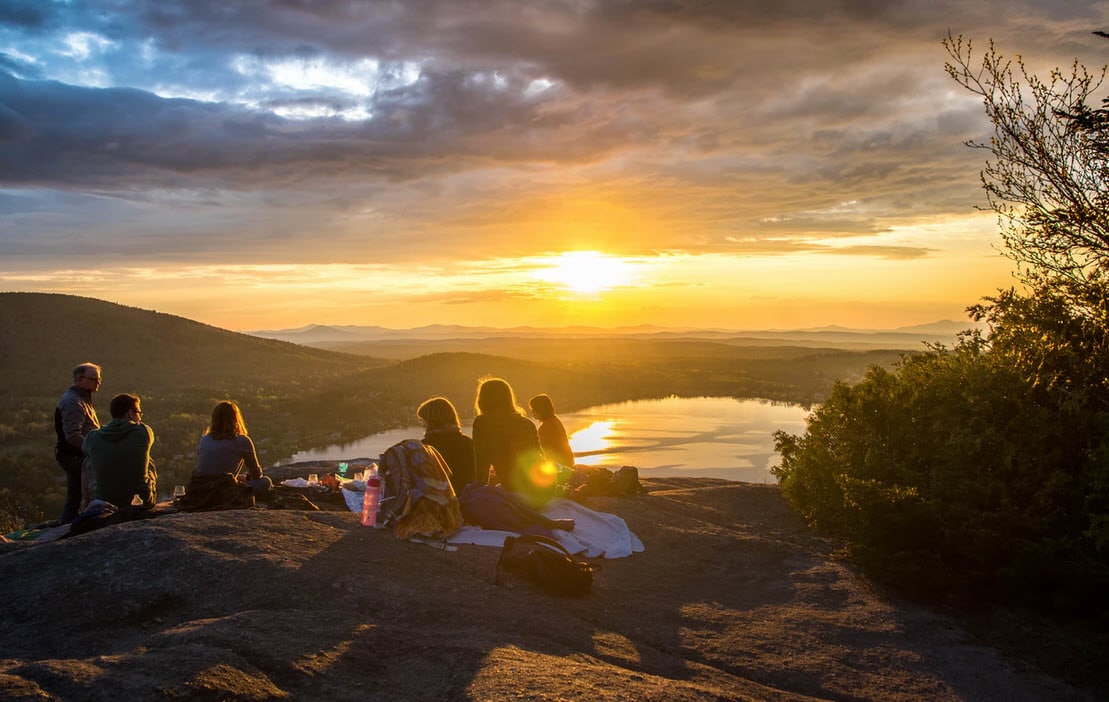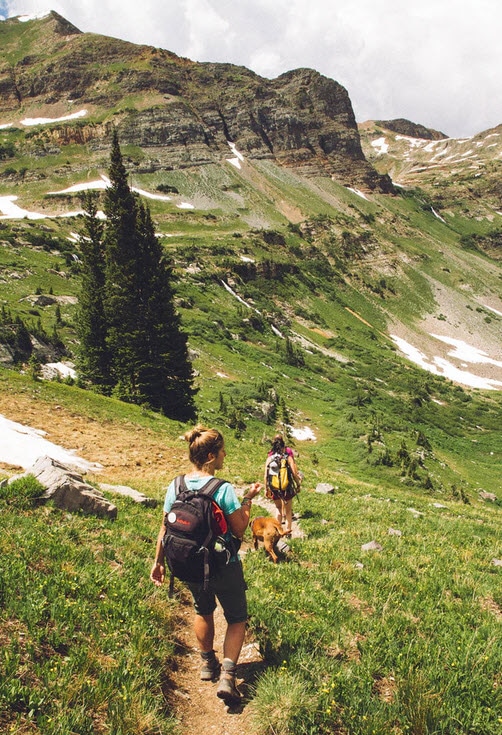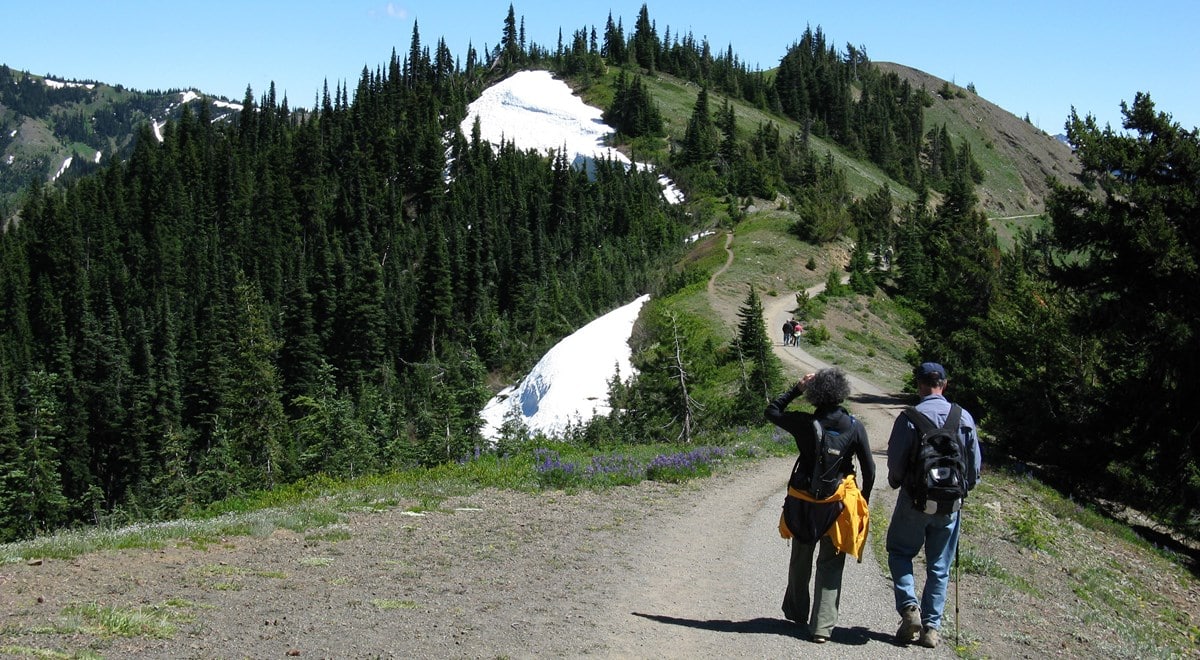
Image source
After being cooped up inside for weeks during the pandemic quarantine, you’re likely eager to get out and reconnect with nature. Of course, boredom and isolation might’ve also added a few extra pounds that need to be walked off, too. A hiking trip can offer you everything you need to recharge your mind, body, and spirit. To get the most out of it, though, you need to plan ahead. Here are eight amazing tips to help you prepare for your next hiking trip.
Page Contents
- Decide The What And Where To Get Prepared
- Use Multiple Resources To Ensure You Have All The Necessary Supplies And Facts
- Avoid The Most Common Mistake: Running Out Of Clean Water
- Plan Your Trip With Purpose
- Adhere To Leave No Trace
- Have A Disaster Plan
- Start Small To Avoid Negative Experiences
- Dress For The Occasion
- What are the physical health benefits of hiking?
- Hiking is good for our mental health as well. Here’s how!
Decide The What And Where To Get Prepared
Popular hiking styles are day, overnight, summit, and long-distance. Each requires different skill sets, supplies, and prep work. The same thing goes for the terrain itself. Is the trail easy, staged, or technical, or will you be bushwhacking your own trail?
The most important component in hiking being a positive experience is to begin by picking a trip that suits your abilities, skill level, and endurance.
Once you’ve decided on a style, select a location and research the applicable rules and regulations. Some locations, for example, may require permits. You’ll need to know whether you can get the permit at the trailhead or must apply in advance online.
Use Multiple Resources To Ensure You Have All The Necessary Supplies And Facts
Your supply list will be contingent on the style and location you select. The longer the hike and/or more difficult the terrain… the more supplies you’ll need. Know the facts.
You can find many helpful hiking supply checklists online. Keep in mind that these are general guides, which is why you’ll want to use several resources to collect hard facts.
Talk to local guides, rangers, and operators about the environment and weather so you’ll know exactly what to expect and bring.
Avoid The Most Common Mistake: Running Out Of Clean Water
One of the most common hiking mistakes is not bringing enough clean water. This is a mistake that can turn an enjoyable hiking experience into a life and death disaster. So, know what you need and pack accordingly.
Determine the minimum amount of water your hike will take. Established trails will offer this in the guidebook. Otherwise, figure a half liter for every hour of hiking in mild to moderate weather and one liter per hour for extreme heat and humidity. That’s your minimum amount; it’s best to err on the side of caution by accounting for getting lost, stopping to rest or play, and so forth with an extra liter.
Drinking from rivers and streams, even when they look clean, is a recipe to end up with a parasite. Have a reliable water source plan to fulfill your water needs. Hydration packs are a convenient and easy way to bring multiple liters of water along with you on your hiking trip.

Image source
Plan Your Trip With Purpose
The physical, mental, and social benefits of hiking are extensive. While these are inherent to the activity itself, you can tailor your benefits with the right preparation.
For example, you’ve been confined and cut off from social connections during quarantine, right? So, you may want to get a hiking group together to reconnect with an overnight hiking trip. Perhaps, you’ve been tirelessly working from home and need a solo trail hike to filter negative thoughts, boost creativity, and disconnect from screen time.
Stop to ponder the goal of your hiking trip. What do you need from it? Factor that into your planning.
Adhere To Leave No Trace
These are minimum impact practices every hiker and camper should apply to their outdoor experiences. The goal is to leave wherever you visit as close to the condition as possible of how you found it by following impact-minimizing principles like looking, not taking; disposing of waste; respecting wildlife; and lessening the impact of your presence in nature.
Have A Disaster Plan
While hiking is beneficial and fun, it’s inherently something you should do expecting the worst case scenario. Accidents happen, and hiking is often done in remote locations with unfriendly terrain and unpredictable wildlife.
You may want to disconnect from technology, but that doesn’t mean you should be foolish in doing it. Bring your cell and an emergency locator for emergencies.
Always tell a reliable person your hiking location and expected time of return. Create a protocol where you will call that person to check in and out from hiking and what steps they need to take if they don’t get the call.
Start Small To Avoid Negative Experiences
You want to immense in nature after being cooped up, but don’t make the mistake of going too big, too fast. Let experience, not excitement, guide your planning.
If you’re new to hiking with a pack, for example, then jump on the treadmill with a pack or walk a mile on a track with it. You’ll find the added weight of backpack hiking is very different from hiking with a small waist pack for a short trail.
Don’t jump from a short one-hour hike to a ten-hour hike. Build your endurance and stamina slowly. If you’re switching from an hourly hike to an overnight hike, then you may want to hire a guide for your first trip to help you gain experience.
It’s also a good idea to start hiking locally first. You can slowly expand your geographical horizons as you become more familiar with your own skills and abilities and the technicalities.

Image source
Dress For The Occasion
Ironically, your clothing matters more in the solitude of the great outdoors than the flashing cameras of New York’s runways. Just the materials you pick can mean the difference in heat stroke or hypothermia and a safe hike. Cotton, for example, doesn’t insulate when wet and takes ages to dry.
Whether winter or summer, synthetic fabrics are always the best base layer. For winter, you’ll want a wool or fleece insulating layer. Windy and rainy environments will add a wind and rain-proof outer layer. Your socks should be hiking-specific to avoid blisters, provide impact-resistance, and wick moisture.
Choose your hiking boots carefully. Try them on with the socks you intend to wear to ensure a proper fit, and make your selection based on the type of hiking you’re doing. Day hiking boots, for example, are often designed for flex, not loads, and offer minimum support. Meanwhile, backpacking boots offer lots of high-cut ankle support and are designed to accommodate heavier loads.
Are You Ready To Hike?
Hiking is the perfect way to say goodbye to the pandemic quarantine. Reconnect and recharge, but don’t forget the above eight tips to ensure your hiking trip is all that it can be and safe. Happy hiking.
What are the physical health benefits of hiking?
Hiking is an excellent way to go outside, explore new places, and move your body. Hiking has numerous benefits for our physical and mental health and it’s one of the most efficient workouts for our body and mind. Unlike other outdoor activities, hiking is quite accessible and people of any age and ability level can hike. Here’s how hiking is good for our physical health:
Builds strong muscles and bones
If you want strong, healthy bones and muscles, you should consider hiking. Every hiking trail will make you adjust to various slope angles and terrain, which will make you use multiple muscle groups throughout the day. Whether it’s rolling hills, steep ascent, or gradual climb, every hike can become a challenge for your body.
For instance, inclines will put your calves, hamstrings, quads, and glutes to work, while the descents will strengthen your hip flexors and knees. Your shoulders, arms, and back will get stronger with each hike if you also carry a backpack. Hiking will activate your core and stabilize the muscles in your torso.
Weight-bearing exercises, such as those associated with hiking, are fantastic for bone health. Like muscles, the bones get stronger with practice and hiking will improve bone strength, density, and overall bone mass.
Improves heart health
Hiking trails can include steep inclines, which can be excellent for our hearts. Hiking is an efficient form of cardiovascular exercise as it increases the heart and respiratory rate blood flow to the small vessels around the heart. The increased blood flow can decrease the risk for heart disease improve cholesterol levels and blood pressure.
It helps you sleep better at night
Studies revealed that physical exercise, hiking including, is an efficient method to sleep better at night. You involve the whole body when hiking and you put your mind to work as well. When you go hiking, you need to examine maps, navigate trails, and stay focused to achieve your goal. Mental and physical exertion will help our minds and bodies sleep throughout the night.
The research revealing the deep connection between hiking and great sleep is vast. Exercise boosts sleep hormones like melatonin, whereas the bright light exposure of the morning sun regulates our circadian rhythm.
Improves your balance
Start hiking if you’re determined to have a better balance. Since you have to use many muscle groups with hiking, your overall strength and balance improve. You need to use your hips and core when hiking and various surfaces will test your balance in multiple ways. The more you hike, the more you choose steeper grades and uneven trails.
You might not see it now, but having a good balance is essential for your life, especially when you get older. We all know about the high risk of hip injury in the elderly. Even if you use the treadmill every day, you should also go hiking to improve your balance.
It helps with other sports
Since you use various muscles, hiking is an excellent cross-training activity. Cross-training is when you practice sports different from the primary sport to enhance your performance. Sports trainers say that exposing your body to new challenges is the best way to fit. In the offseason, many athletes choose cross-training to remain fit.
It builds your endurance
Pick hiking as your top outdoor activity if you aim to build endurance. Compared to other forms of cardio (running, for example), hiking is instead a low-intensity exercise. Even if it’s not very easy, hiking is almost never intense or strenuous. However, if you keep your heart rate around the zone 2 range for a long time, your body will still build an aerobic base and improve endurance.
Entry-level hikers should start with short, less technical hikes, whereas more experienced hikers should opt for backpacking trips.
Hiking is good for our mental health as well. Here’s how!
Hiking is fantastic because it’s both good for the body and mind. Here’s how it’s beneficial for our mental health:

It lowers stress and anxiety
Hiking helps you get in touch with your body and Nature, and it’s a healthy method to deal with day-to-day stressors. It helps your body release endorphins (the “happiness hormones”) and makes you feel happy.
A 2015 study revealed that a 90-minute walk in Nature could help decrease rumination, which means constant overplaying the anxieties and thoughts. Additionally, hiking on sunny days has health benefits such as increasing Vitamin D—it’s crucial for our bone and immune health and improves mood regulation.
It improves your connection with Nature
Since you’re not moving very quickly, like with biking or running, you can truly enjoy the beauty that Nature has to offer. When you hike, you get to use all your senses: hearing, smelling, touching, and even tasting at times. It’s a full-body experience that helps you disconnect from the city life at home and enjoy the time out.
It helps you connect with your hiker friends
Hiking is impressive because it’s more than enjoying the views. You will need to learn when to take a break, decode a trail map, set the pace, and manage inclement weather. All these challenges involve problem-solving, consistent communication, and teamwork. Since you probably don’t go hiking alone (you should never do it, by the way), you will be able to strengthen the relationship with your hiking friends or family members you go with.
It keeps your mind sharp
When hiking, you need to remain focused on your surroundings look for trail markers, hazards, and wild animals that might cross your path. Through mental awareness, you activate the part of the brain that controls navigation and spatial memory. Starting various areas and creating new pathways in the brain will keep your mind sharp—it’s something that hiking does. You will notice an improvement in your memory cognition and have a lower risk for developing Alzheimer’s.
It improves your self-esteem
Hiking will make you connect with yourself and shift your mindset. It boosts your self-esteem because you find the solution to challenging problems that can occur when hiking. Taking on new challenges is one of the most efficient methods to improve our self-esteem and feelings of self-worth. Most hiking trails will bring challenges you have never dealt with before. There’s no great feeling than reaching the top of the mountain after a multi-day backpacking hiking.
You become part of a community
The benefits of community involvement are many and being part of one can improve our mental health. It offers a sense of purpose and belonging. When you hike, you become a part of one of the most significant communities worldwide; there are millions of hikers across the country.








